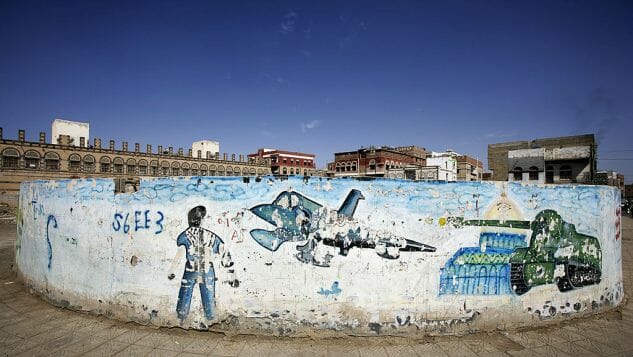U.S. Bombs: How We Helped Break Yemen
America dropped 26,000 bombs last year. This is the story of a few.
Brent Stirton / Getty
The United States is helping Saudi Arabia bomb the poorest country in the Middle East. We need to stop.
The nation of Yemen stands on the brink of starvation. Serious famine could result from the continued application of American might; we will be party to even more serious crimes if we continue to back the Saudi regime’s agenda. Yesterday, a primary school was hit in an air strike by Saudi forces.
Last fall, the Obama administration decided to block arms deals to Riyadh. That’s not enough. Our fingerprints are all over this one.
The Yemen conflict started on March 26 of 2015, but the strife is one with a long backstory. The simplest version goes like this: to quote the World Bank, “An Arab coalition of nine countries led by Saudi Arabia initiated a military campaign to restore President Hadi’s government to power.”
In other words, the Saudis and their friends, including America, are intervening in Yemen. The Saudis are afraid that Iran is setting up a new puppet government there, so they want to put the old moderate government back in charge.
That’s the clinical explanation. What’s actually happening is that a lot of poor people are being killed by missiles, and bombs, and other munitions. Washington nods, and smiles, and gives the go-ahead. Americans refuel Saudi aircraft. Americans provide coordination with the Saudi military. Americans offer the Saudis a hundred other little favors. We are co-conspirators.
As a wise man once said, there are two powers in the world, America, and global opinion. A good rule of thumb for understanding world politics: whenever an American ally makes a big move in the realm of foreign affairs, the ally usually clears it with the American government first. This is not universally true, but it’s usually the safe way to bet.
That’s why this country is tangentially complicit in so many different kinds of human rights outrages. America pretending to have clean hands in world politics is like the beat cop pretending to not notice organized crime operating under his nose. Where our allies are concerned, we have a huge amount of influence.
Example: until recently, the Americans peddled all kinds of munitions to the Saudi military; we sold $20 billion of them in 2015. We only stopped on Dec. 13, 2016, when the Administration halted a sale by Raytheon to the Saudi Kingdom. The White House was getting it from human rights groups and couldn’t proceed as before. In fact, the Obama administration, to quote Reuters, has sold the Arabian Kingdom over $115 billion in various war goods, more than “any U.S. administration in the 71-year U.S.-Saudi alliance.”
Remember, this is all being done under the watch of a Nobel Peace Prize recipient, so it’s totally morally cool.
Twenty-three illegal air strikes, using our weapons, have killed children and other civilians. This all got noticed, by the way, when our weapons flattened over one hundred and forty people last October, during a funeral in Yemen.
-

-

-

-

-

-

-

-

-

-

-

-

-

-

-

-

-

-

-

-

-

-

-

-

-

-

-

-

-

-

-

-

-

-

-

-

-

-

-

-








































